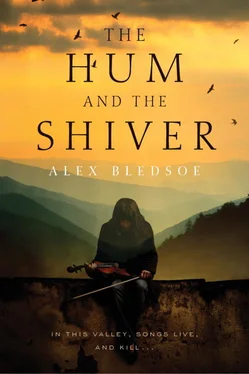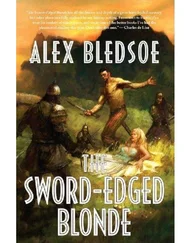“Thanks.”
Bliss kissed Bronwyn on the top of her head, then saw the figure Ed had given her. She picked it up and looked it over, paying special attention to the delicate wings. “Pretty good resemblance,” she observed.
“Maybe two years ago,” Bronwyn said.
“You’ve been through a lot. But you’re home, and we care for our own.” She put down the carving and made a slow, elaborate hand gesture. “You know that.”
Bronwyn responded with another similar gesture, but it was weak and weary, as she now was. “I know. But they tried that with Humpty Dumpty, too. Didn’t work out.”
Bliss smiled. The authority of a leader was replaced with a sisterly affection. “They just didn’t know the right song.”
Bliss’s headlights raked across the bedroom window as she backed from the yard, turned, and drove away. Bronwyn wondered if the visit had even awakened Deacon, Chloe, or Aiden. There was etiquette involved when one First Daughter visited another on official business, but this seemed more clandestine: not secret exactly, but certainly discreet. If Chloe was marked, if Bronwyn really did need to take her place soon, then the less fuss, the better for the community at large.
Mom…
Bronwyn had a sudden, vivid image of her mother in a coffin, her face still and pale, her dark hair arranged around her shoulders. This merged with a flash of memory, of Steve Caffaro sprawled on the sand beside her, eyes open but sightless. Then came the blow that crushed her like a swatter coming down on a fly as yet another IED went off nearby.
“Private Hyatt… Private Hyatt…”
She opened her eyes. Had she been asleep? Someone had turned off the light, and the room was black. She felt a shiver along the back of her neck as the situation’s reality set in. The voice could be only one thing. Her haint, a genuine ghost, was calling for her from the darkness outside. Apparently it was just waiting its turn.
This wouldn’t be the first haint she’d encountered. When she was nine, she’d spotted one walking slowly along the curve of County Highway B. It had been just after midnight, and she was returning home with a pillowcase full of bullfrogs. The haint resembled an old man, and hummed to himself as he shuffled along. His footsteps made no sound as he scuffed across the gravel toward her, and he vanished in the headlight beams of her father’s truck as he arrived to pick her up. She’d gotten six swats from Deacon’s belt that night, which took priority over the haint. So she’d never told anyone except Dwayne about it.
She’d seen another haint, a little girl this time, when she was thirteen and stumbling drunkenly along the tractor path between her father’s land and the Hamilton farm. And she thought a third encounter was a haint, but it turned out to be simply wild child Curnen Overbay, Bliss’s forest-roaming, possibly retarded sister.
But this was the first one that called her name, in a voice so soft, she wasn’t sure at first it was even more than the wind. It was the first one specifically haunting her. And it was creepier than she ever imagined.
She rolled onto her side as much as her shattered leg allowed and peered past the American flag curtain. A shape materialized out of the darkness, lighter than the surrounding night. She swallowed hard as it resolved into a young woman in desert combat fatigues, with strands of dark hair dangling from under her helmet. Her left side was missing a basketball-sized chunk of flesh, leaving a jagged gap from the top of her hip to her rib cage. The edge was black with blood.
Bronwyn swallowed hard. “Not now,” she whispered.
“Private Hyatt…,” the haint repeated.
She drew courage from the blue glass on the windowsill. Still soft, but more firmly, she said, “Soon. But not now. ”
The haint tilted its head and silently, expectantly gazed at Bronwyn. It was hard to look directly at it; when Bronwyn focused on any specific part, like the face or the gaping injury, the details went fuzzy. It was like something glimpsed in the corner of your eye that vanishes when you turn toward it. Then it seemed to both back away and fade until the shadows reabsorbed it. In moments it was completely gone.
Bronwyn rolled onto her back and sighed. She was sweating, the chill kind that comes after a narrowly avoided disaster. There was a tingle in her throat that, for a moment, seemed about to develop into a sob. But like the haint, it too faded into nothingness.
Still, there would be no sleeping anytime soon. She turned on the lamp and laboriously used her crutch to drag the mailbag to her bedside. She took a handful of cards and letters and put them on her stomach.
The first one said, We hope and pray for your swift recovery. God bless you for your service to our country.
The second one said, Without people like you, the ragheads would have struck us again. I think you deserve a medal for every one of those bastards you sent to hell. Stay strong, and keep the faith.
The third said, You’re no more a “hero” than my fucking dog. You’re a pawn being used by the right wing to pander to its illiterate, TV-sucking constituents. Between you, American Idol, and global warming, we’ve proved without a doubt that the human race is worthless. The letter was signed, A global citizen.
Bronwyn stared at this one, trying to decide how she felt about it. It should piss her off; these were the cowards who didn’t know they were cowards, people who didn’t understand the need to meet violence with violence. She’d joined her fellow soldiers in mocking them, and truly felt they were as big a danger as those wild-eyed grunts who craved the experience of killing another human being.
Something Bliss once told her came back vividly. They’d been seated on the edge of a cliff looking down over the valley, their bare feet dangling in the breeze. Bronwyn had been maybe ten. “There is no sanctity of life,” Bliss told the younger girl. “There’s always something that has to kill something else, either to eat it or to protect itself from it. And even with people, there’s some that just need killing. I remember a fella named Ardis, who used to live down by Trebbel Creek. He was the meanest fella anyone ever knew.”
“Meaner than Rockhouse Hicks?” Bronwyn had asked. Even among the children, the old man was notorious for his vindictive cruelty.
“Honey, he made Rockhouse look like a dang pussycat. But Ardis was Tufa, he had his song, and we put up with him as long as we could. But finally…”
“What’d he do?”
“Beat a fella’s dog to death. Tied the dog’s paws and beat it to death with a baseball bat. Started with the back legs and worked his way up so the dog would suffer the most.”
“Why?”
“The owner accidentally cut him off on the highway. So Ardis followed him home, stole his dog, beat it to death, and left it back on his driveway.”
Bronwyn was silent for a long time.
“You should feel bad hearing that,” Bliss finally said. “Just because we’re Tufa and can ride the night wind doesn’t make us above the rules of right and wrong. Ardis thought it did, thought that we’d protect him.”
“We didn’t? I mean, you didn’t? They didn’t?”
“‘We’ is always right. No, we didn’t. A man who’ll kill an animal that way will eventually move on up to people if he’s not stopped. The legal system says you have to wait until after the crime to remove them from society, but we have our own rules, and our own ways of dealing with things. He showed up at the barn dance to play, and no one stayed to listen. The next day he was found right there.” She pointed down, where the cliff ended eighty feet below at the tops of the trees. From this height, the highway resembled a gray ribbon.
Читать дальше












